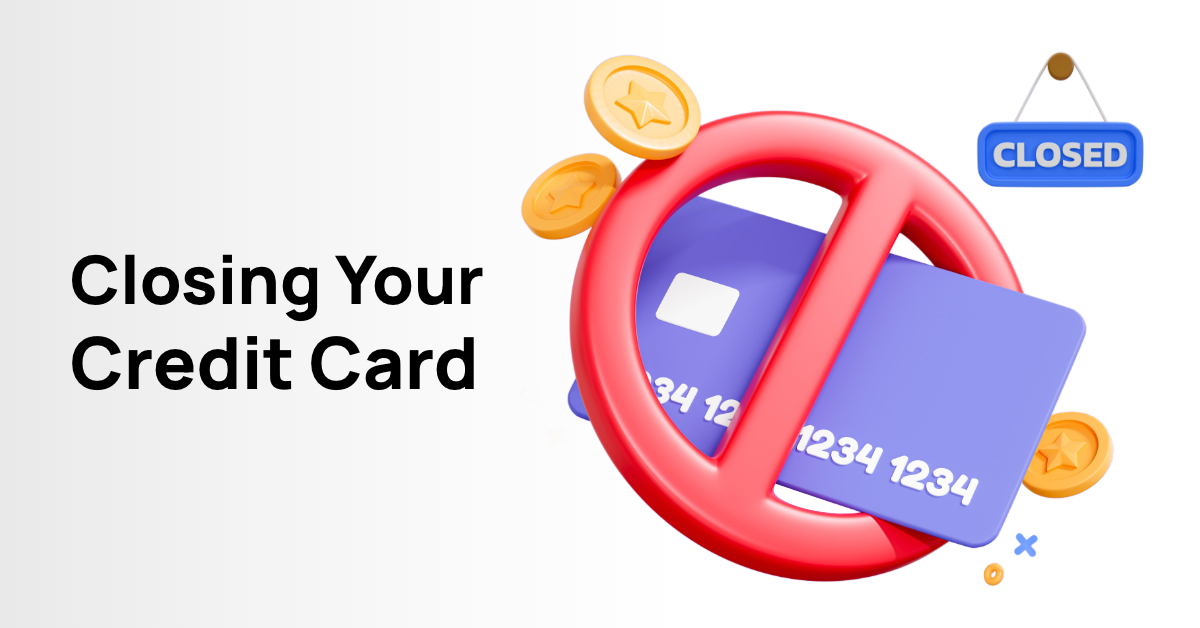How to Close or Cancel Credit Card?
By OneCard | November 22, 2023

Credit cards are a great financial tool. From managing daily expenses to earning several benefits, they are a splendid choice. However, if you have opted for a credit card only for a particular goal, it may become redundant in some time. In that case, you might want to cancel your credit card.
Though it has no harm in keeping multiple cards. However, if you still wish to know the process of cancelling a credit card, this blog will walk you through the process and some essential factors to consider before cancelling a credit card.
Table of contents:
Factors to Consider Before Cancelling a Credit Card
Before cancelling a credit card, consider these factors:
-
Impact on Credit Score: Closing a credit card may affect your credit score, especially if it’s one of your older accounts, or if you have a high credit utilisation ratio. Evaluate the potential consequences before making a decision.
-
Outstanding Balances: Ensure you clear all outstanding balances on the credit card you intend to close. Closing a card with unpaid balance could harm your credit score and lead to additional charges.
-
Rewards and Benefits: Assess the rewards program, cashback offers, or exclusive benefits associated with the credit card. If the credit card offers valuable perks that align with your lifestyle or spending habits, it may be worth keeping it active.
-
Credit History Length: The length of your credit history plays a crucial role in determining your creditworthiness. If the credit card you’re considering closing is one of your older accounts, closing it may shorten your credit history, potentially impacting your credit score.
-
Annual Fees: Evaluate whether the credit card charges an annual fee. If the fee outweighs the benefits you receive from the card, it might be a good idea to close it. However, if the benefits justify the fee, you may want to explore other options before making a decision.
-
Credit Utilisation Ratio: Closing a credit card can impact your overall credit utilisation ratio, which is the percentage of your available credit you have currently used. If closing the card significantly increases your utilisation ratio, it might negatively affect your credit score. Consider the impact on your credit utilisation ratio before proceeding.
-
Impact on Credit Mix: Lenders prefer to see a diverse mix of credit accounts on your credit report, which may consist of credit cards, and loans. If the credit card you plan to close is your only credit card or the only one in a particular category (e.g., travel rewards), it may be worth keeping it open to maintain a healthy credit mix.
-
Debt Consolidation: If you’re looking to consolidate your credit card debt, closing a credit card may not be the best approach. Explore alternatives like balance transfers or debt consolidation loans to streamline your payments and reduce interest charges.
ALSO READ: How Fraudsters Use Psychology To Con You
How to Close or Cancel a Credit Card?
Closing a credit card can be done in different ways. Here are the steps for each approach:
Call Customer Care
- Contact the issuer’s customer care helpline.
- Follow the instructions and provide the necessary details.
- Verify your identity by answering security questions.
- Follow any additional instructions provided by the representative.
Submit a Request in Writing
- Log in to the credit card issuer’s online portal or mobile app.
- Locate the option to close or cancel your credit card.
- Follow the on-screen instructions and provide the requested details.
- Confirm your intention to close the credit card.
- Submit the request electronically and keep a copy for your records.
Cancelling a Credit Card Has to Be a Conscious Decision.
Before cancelling a credit card, evaluate its impact on your credit score, settle any outstanding balances, and consider your overall credit utilisation rate. When ready to proceed, choose the method that suits you best—calling customer care, submitting a written request, or using the online platform. By following these steps, you can successfully close a credit card while minimising the potential negative effects.
FAQs on How to Close a Credit Card
Is it better to cancel unused credit cards?
If you are not incurring hefty charges, you can always consider keeping your credit card. However, consider the factors mentioned earlier, such as credit score impact and credit utilisation rate, before making a decision.
How do I permanently close my credit card?
To permanently close a credit card, follow the specific steps provided by your credit card issuer. Typically, it involves contacting customer care, submitting a written request, or using the online portal to close the card.
Can I close my credit card online?
Yes, many credit card issuers offer the option to close a credit card online through their banking portals or mobile apps. Look for the relevant option and follow the provided instructions.
What happens if you cancel a credit card with a balance?
It’s important to clear any outstanding balances before cancelling a credit card. If you cancel a card with a balance, you are still responsible for paying off the debt according to the terms and conditions of your credit card agreement.
In case you have ongoing EMIs when you are opting to close your account, you have two options: either you can close the tenure by paying the foreclosure amount and additional charges, or you can transfer the account to get an alternative solution.
Will closing a credit card affect your credit score?
Closing a credit card may impact your credit score, particularly if it results in a higher credit utilisation ratio or reduces the average age of your credit accounts. However, the effect varies based on individual circumstances and overall credit history.
Is it bad to cancel a credit card?
Cancelling a credit card is not necessarily bad, but it may have implications for your credit score and credit history. Consider the factors discussed earlier and make an informed decision based on your financial circumstances.
**Disclaimer: The information provided in this webpage does not, and is not intended to, constitute any kind of advice; instead, all the information available here is for general informational purposes only. FPL Technologies Private Limited and the author shall not be responsible for any direct/indirect/damages/loss incurred by the reader for making any decision based on the contents and information. Please consult your advisor before making any decision.


Credit Card Flight Offers: Tips & Tricks to Maximise Your Rewards



Sharing is caring 😉